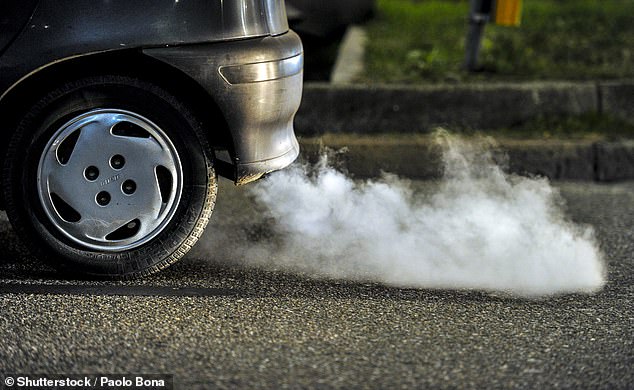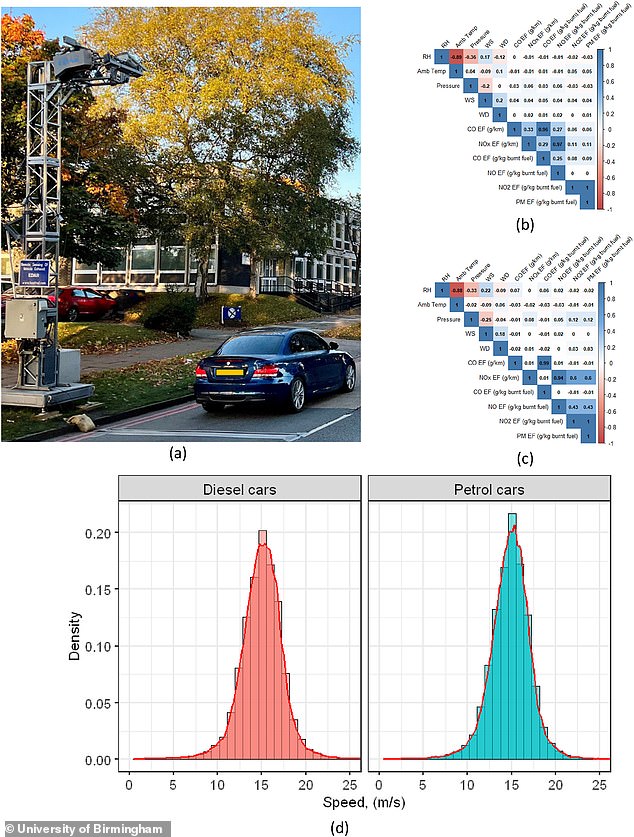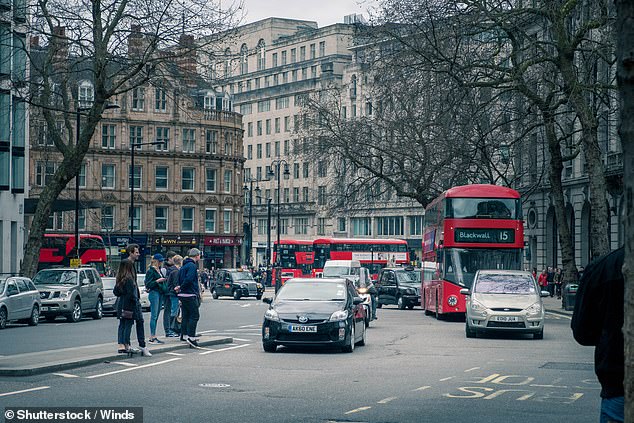Low-income households with cheaper cars are ‘contributing disproportionately to their local urban air quality problems’, according to a new study.
Scientists from the University of Birmingham said the findings ‘reverse the usual pattern’ where wealthy households typically cause more greenhouse gas emissions through higher consumption.
The newly-published report is based on analysis of over 50,000 vehicles being driven on UK roads.
With the help of the Natural Environment Research Council (NERC), scientists used ‘advanced remote sensing technology’ to measure real-time emissions on the city’s streets as motorists passed and combined this with ‘machine learning-based price estimation’ to make its calculations.
And it found that more expensive vehicles produced fewer harmful pollutants, including nitrogen dioxide (NO₂) and oxide (NOx), carbon monoxide (CO), and particulate matter (PM).
The study somewhat conflicts with various reports from environmental think tanks who have pointed the finger at the popularity of large, expensive ‘mega SUVs’ – like Range Rovers and BMW X7s – for having a detrimental impact on air pollution levels.

Low-income households with cheaper cars are ‘contributing disproportionately to their local urban air quality problems’, a new study has claimed
The report summarised that higher-priced vehicles ’emit significantly fewer pollutants’ – even within the same Euro emission class (which is determined by the year a car was built).
Scientists highlighted diesel cars in particular when making their correlation between higher vehicle price and lower emissions.
The study approximated that the average diesel vehicle costing £5,000 puts out 8.8 g/litre of NOx, while one that cost £15,000 emits only 5.6 g/litre.
It said diesels ‘show greater emission reductions per £1,000 increase in price than petrol vehicles’, with every additional £1,000 spent on a diesel car seeing a reducing in NO₂ outputs by around 0.4 g/litre of fuel.
The analysis suggests that spending an additional £10,000 on a diesel car is associated with a more than 40 per cent reduction in NOx emissions, which have been linked to increasing the risk of respiratory problems as well as environmental damage and accelerating climate change.
Report co-author Professor Francis Pope said: ‘Our study provides the first clear evidence to support vehicle price being a reliable indicator of emission performance – powerfully illustrating how citizens’ economic capacity can directly influence environmental outcomes and urban air quality.
‘Individuals from lower-income households may be more likely to own older, cheaper, and higher-emitting vehicles – contributing disproportionately to local air pollution.’

Scientists from the University of Birmingham said the findings ‘reverse the usual pattern’ where wealthy households typically cause more greenhouse gas emissions through higher consumption

Scientists gathered data from 50,000 vehicles using ‘advanced remote sensing technology’ to measure real-time emissions on the city’s streets and combined this with ‘machine learning-based price estimation’

The analysis suggests that spending an additional £10,000 on a diesel car is associated with a more than 40% reduction in nitrogen oxide emissions
The obvious factor impacting pricing and fewer harmful pollutants is fuel type, with battery electric cars producing zero tailpipe emissions and therefore the greenest option, though EVs have a steep price premium over an equivalent combustion engine model.
But to suggest the priciest cars are the least emitting flies in the face of other studies that have singled out the expanding SUV market for the impact on air quality.
A report by the International Energy Agency last year claimed expensive SUVs are responsible for ‘over 20 per cent of the growth in global energy-related CO2 emissions’ in 2023.
‘If SUVs were a country, they would be the world’s fifth largest emitter of CO2,’ it stated.
‘[They] weigh 200 to 300kg more than an average medium-sized car, and typically take up nearly 0.3 m2 more space – emitting roughly 20 per cent more carbon dioxide.
‘The trend towards heavier and less fuel-efficient cars increases energy demand, including oil and electricity use, as well as demand for basic metals and critical minerals needed for battery production.
‘Over the course of 2022 and 2023, global oil consumption directly related to SUVs rose by a total of over 600,000 barrels per day, accounting for more than a quarter of the overall annual growth in oil demand,’ it said.

The report found that more expensive cars generally produce fewer harmful pollutants, particularly nitrogen dioxide (NO₂) and oxide (NOx), carbon monoxide (CO), and particulate matter (PM)
University of Birmingham scientists called on policy makers to take note of their groundbreaking study and to take several actions to tackle the problem they’ve linked to correlation between vehicle price and emissions.
This includes introducing ‘progressive tax structures’ based on vehicle emissions and price to incentivise cleaner vehicle adoption, and provide rebate schemes or scrappage incentives for lower-income households to accelerate the transition to cleaner transport.
Report co-author Dr Omid Ghaffarpasand said: ‘Our findings underscore the need for targeted policy interventions to address environmental injustice.
‘Lower-income communities bear the brunt of local air pollution due to limited access to cleaner vehicles – exacerbating health risks and pollution exposure in disadvantaged urban areas.’

